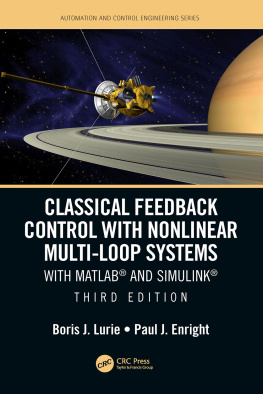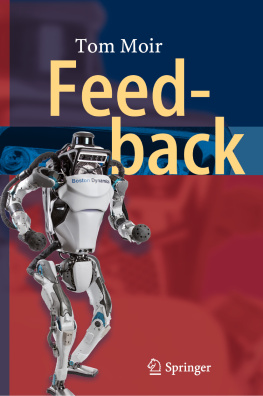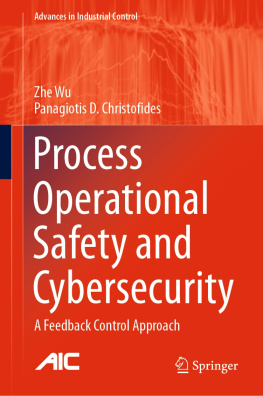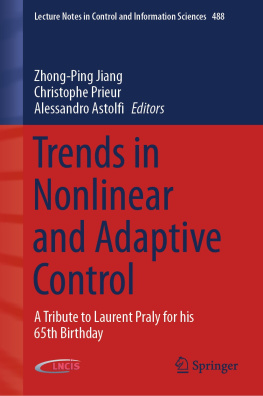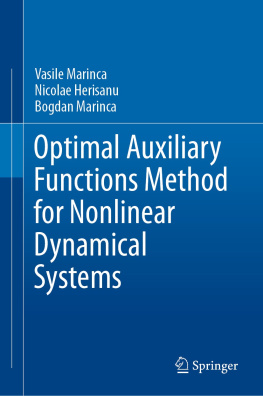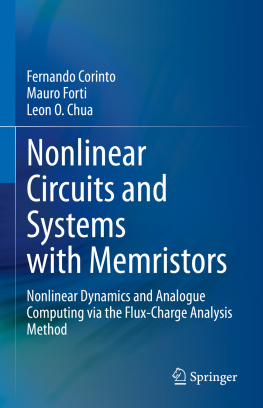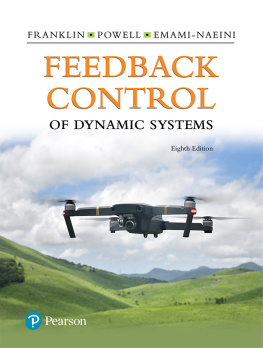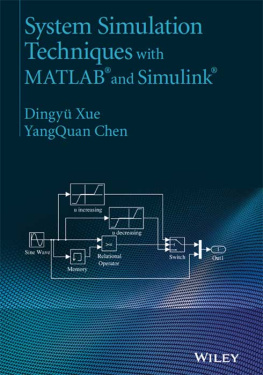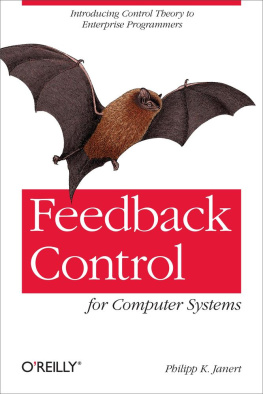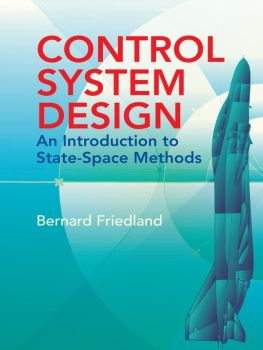Classical Feedback Control with Nonlinear Multi-Loop Systems
With MATLAB and Simulink Third Edition
Automation and Control Engineering
Series Editors - Frank L. Lewis, Shuzhi Sam Ge, and Stjepan Bogdan
Networked Control Systems with Intermittent Feedback
Domagoj Tolic and Sandra Hirche
Analysis and Synthesis of Fuzzy Control Systems: A Model-Based Approach
Gang Feng
Subspace Learning of Neural Networks
Jian Cheng Lv, Zhang Yi, Jiliu Zhou
Synchronization and Control of Multiagent Systems
Dong Sun
System Modeling and Control with Resource-Oriented Petri Nets
MengChu Zhou, Naiqi Wu
Deterministic Learning Theory for Identification, Recognition, and Control
Cong Wang and David J. Hill
Optimal and Robust Scheduling for Networked Control Systems
Stefano Longo, Tingli Su, Guido Herrmann, and Phil Barber
Electric and Plug-in Hybrid Vehicle Networks
Optimization and Control
Emanuele Crisostomi, Robert Shorten, Sonja Stdli, and Fabian Wirth
Adaptive and Fault-Tolerant Control of Underactuated Nonlinear Systems
Jiangshuai Huang, Yong-Duan Song
Discrete-Time Recurrent Neural Control
Analysis and Application
Edgar N. Snchez
Control of Nonlinear Systems via PI, PD and PID
Stability and Performance
Yong-Duan Song
Multi-Agent Systems: Platoon Control and Non-Fragile Quantized Consensus
Xiang-Gui Guo, Jian-Liang Wang, Fang Liao, Rodney Swee Huat Teo
For more information about this series, please visit: https://www.crcpress.com/Automation-and-Control-Engineering/book-series/CRCAUTCONENG
Classical Feedback Control with Nonlinear Multi-Loop Systems
With MATLAB and Simulink
Third Edition
Boris J. Lurie and Paul J. Enright

MATLAB and Simulink are trademarks of the MathWorks, Inc. and are used with permission. The MathWorks does not warrant the accuracy of the text or exercises in this book. This books use or discussion of MATLAB and Simulink software or related products does not constitute endorsement or sponsorship by the MathWorks of a particular pedagogical approach or particular use of the MATLAB and Simulink software.
CRC Press
Taylor & Francis Group
6000 Broken Sound Parkway NW, Suite 300
Boca Raton, FL 33487-2742
2020 by Taylor & Francis Group, LLC
CRC Press is an imprint of Taylor & Francis Group, an Informa business
No claim to original U.S. Government works
Printed on acid-free paper
International Standard Book Number-13: 978-1-1385-4114-6 (Hardback)
This book contains information obtained from authentic and highly regarded sources. Reasonable efforts have been made to publish reliable data and information, but the author and publisher cannot assume responsibility for the validity of all materials or the consequences of their use. The authors and publishers have attempted to trace the copyright holders of all material reproduced in this publication and apologize to copyright holders if permission to publish in this form has not been obtained. If any copyright material has not been acknowledged, please write and let us know so we may rectify in any future reprint.
Except as permitted under U.S. Copyright Law, no part of this book may be reprinted, reproduced, transmitted, or utilized in any form by any electronic, mechanical, or other means, now known or hereafter invented, including photocopying, microfilming, and recording, or in any information storage or retrieval system, without written permission from the publishers.
For permission to photocopy or use material electronically from this work, please access www.copyright.com (www.copyright.com/) or contact the Copyright Clearance Center, Inc. (CCC), 222 Rosewood Drive, Danvers, MA 01923, 978-750-8400. CCC is a not-for-profit organization that provides licenses and registration for a variety of users. For organizations that have been granted a photocopy license by the CCC, a separate system of payment has been arranged.
Trademark Notice: Product or corporate names may be trademarks or registered trademarks, and are used only for identification and explanation without intent to infringe.
Library of Congress CataloginginPublication Data
Names: Lurie, B. J., author. | Enright, Paul J., author.
Title: Classical feedback control with nonlinear multi-loop systems : with
MATLAB and Simulink / Boris J. Lurie and Paul J. Enright.
Other titles: Classical feedback control with MATLAB
Description: Third edition. | Boca Raton : Taylor & Francis, CRC Press,
[2020] | Series: Automation and control engineering | Original edition
publised under title: Classical feedback control with MATLAB. | Includes
bibliographical references and index.
Identifiers: LCCN 2019016601| ISBN 9781138541146 (hardback : alk. paper) |
ISBN 9781351011853 (e-book)
Subjects: LCSH: Feedback control systems. | Nonlinear systems. | MATLAB. |
SIMULINK.
Classification: LCC TJ216 .L865 2020 | DDC 629.8/3028553--dc23
LC record available at https://lccn.loc.gov/2019016601
Visit the Taylor & Francis Web site at
http://www.taylorandfrancis.com
and the CRC Press Web site at
http://www.crcpress.com
Contents
Classical Feedback Control describes the design and implementation of high-performance feedback controllers for engineering systems. The book emphasizes the frequency-domain approach, which is widely used in practical engineering. It presents design methods for linear and nonlinear high-order controllers for single-input, single-output and multi-input, multi-output analog and digital feedback systems. Although the title word classical refers to the frequency-domain approach, this book goes well beyond the over-simplified classical designs that are typically included in contemporary texts on automatic control.
Modern technology allows very efficient design and implementation of high-performance controllers at a very low cost. Conversely, several analysis tools that were previously considered an inherent part of control system courses limit the design to low-order (and therefore low-performance) compensators. Among these are the root-locus method, the detection of right half-plane polynomial roots using the RouthHurwitz criterion, and extensive algebraic calculations using the Laplace transform. These methods are obsolete and are granted only a brief treatment in this book, making room for loop-shaping, Bode integrals, structural simulation of complex systems, multi-loop systems, and nonlinear controllers, all of which are essential for good design practice.
In the design philosophy adopted in Classical Feedback Control , Bode integral relations play a key role. These integrals are employed to estimate the available system performance and to determine the ideal frequency responses that maximize the disturbance rejection and the feedback bandwidth. This ability to quickly analyze the attainable performance, before detailed synthesis and simulation, is critical for efficient system-level trades in the design of complex engineering systems, of which the controller is one of many subsystems. Only at the final design stage do the compensators need to be designed in detail, using high-order approximations of the ideal frequency responses. Nonlinear dynamic compensators are used to provide global stability and to improve transient responses. The controllers are then economically implemented using analog and digital technology.

